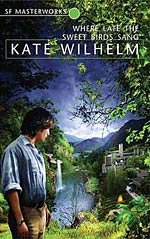
![]() Tantara
Tantara
1/14/2012
![]()
One one level, Kate Wilhelm’s Hugo-winner Where Late the Sweet Birds Sang is a brilliant and insightful musing on one possible set of implications of cloning. On another, it is an environmental/ecological cautionary tale. But at its heart, it is a family saga spanning several generations. I was immediately charmed by this story’s warmth and humanity. The first few chapters perfectly set the stage for what is to come, introducing the central family at a time when things are mostly normal, a time before the world began to disintegrate and life took on a thousand forms of adversity and complexity. I liked this family, appreciated their strong loyalties and values. I wanted things to go well for them.
But things do not go well, or at least not as planned. Ecological, economic, and environmental turmoil ensues, and the process is wholly believable to a modern reader. Wilhelm was remarkably prescient in her writing, and the book feels neither dated nor far-fetched in its allusions to these societal troubles. She writes as a realist, neither heavy-handed nor preachy. Yet she is unflinching in authenticity, and I was fully convinced that her future is not only plausible, but at least partially probable. This apocalypse makes a bang for the world at large, but in the microcosm of the world of the central family, the effect is more akin to a whisper spreading out through the generations, impossible to ignore, until finally it is the only sound left.
Lest I spoil anything essential, I will only circle around the novel’s plot beyond what is plainly told on a dust jacket synopsis. Due to the aforementioned worldly catastrophes, fertility is drastically impaired – both for animals and humans. One large, extended family, blessed both with resources and the ingenuity of a number of brilliant and resourceful individuals, devises a long-long-term plan to both allow the family to survive and to provide for the clan in the future. The result is the single most insightful, well-rounded, and horrific exploration of the wider implications of cloning I’ve ever encountered, (Kazuo Ishiguro's Never Let Me Go included) as well as a true-ringing exploration of one family's struggle in a post-apocalyptic world. Labeling these people "tenacious" only scratches the surface of their character. I kept hearing Robert A. Heinlein in my head, chanting a litany: "Specialization is for insects." Indeed, specialization is what initially allows the family to survive, through their polymathic panoply of diversely-skilled members. But over time, an almost insect-like efficiency and homogeneity prevails and affords the family the strengths it needs to thrive. (Of course, as things tend to be cyclic in nature, what goes around comes around again...)
The book is organized into sections focusing on successive generations of the family, and each is at once more alien and more familiar than the last. Wilhelm is adept at engendering empathy in the reader, coaxing you to understand the motives and choices the family must employ, even when those paths seem unthinkable or distasteful. Whatever gets to you on a personal level - a young man struggling with unrequited or lost love, a young woman determined to be independent even at the expense of her heart, a father figure making hard decisions for his family, a woman wanting something better for her child, a boy striving to fit in yet be different, a woman afforded no rights, a scientist desperately seeking solutions, an artist seeing the world differently, a youth determined to make his own path in the world...selfish, selfless, self-sacrificing, self-centered - they're all here, and more. In fact, nearly every conceivable facet of "the self" can be found in the whole of the entity of "the family", filtered through thematic lenses of adaptation vs stagnation, conformity vs self-determination, tradition vs innovation. This is social/anthropological/archetypal science fiction at its absolute best, exploring with unclouded eyes the ability of humanity to endure through adaptation, through re-inventing itself as something new as many times as necessary, to discover, re-discover, and explore territory both new and old, and to finally emerge from its chrysalis reborn, yet perhaps even more fully human than ever.
I feel Kate Wilhelm (perhaps better known in some reader circles for her mysteries) has created an absolute classic of speculative literature which is tragically under-exposed. I was enormously enriched by this reading experience, and I know I will revisit this title again and again over the years, now that its seed has been sown in me. I enthusiastically recommend Where Late the Sweet Birds Sang to all fans of intelligent fiction.
http://www.sfsolitaire.blogspot.com/